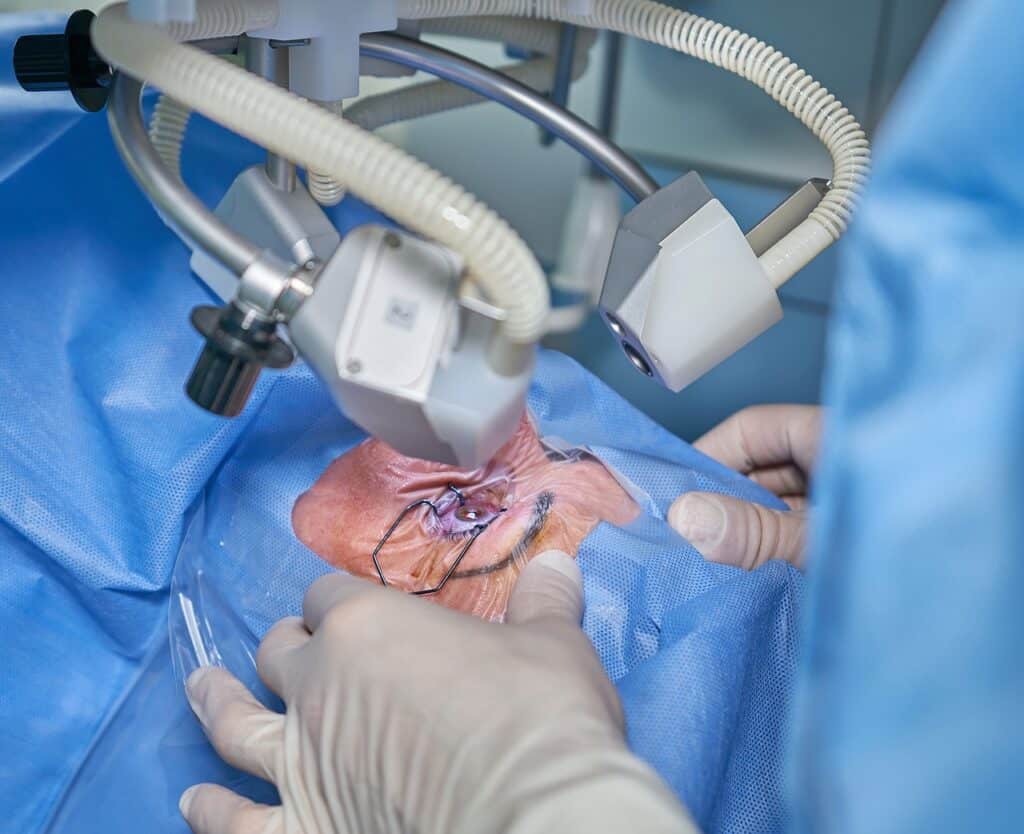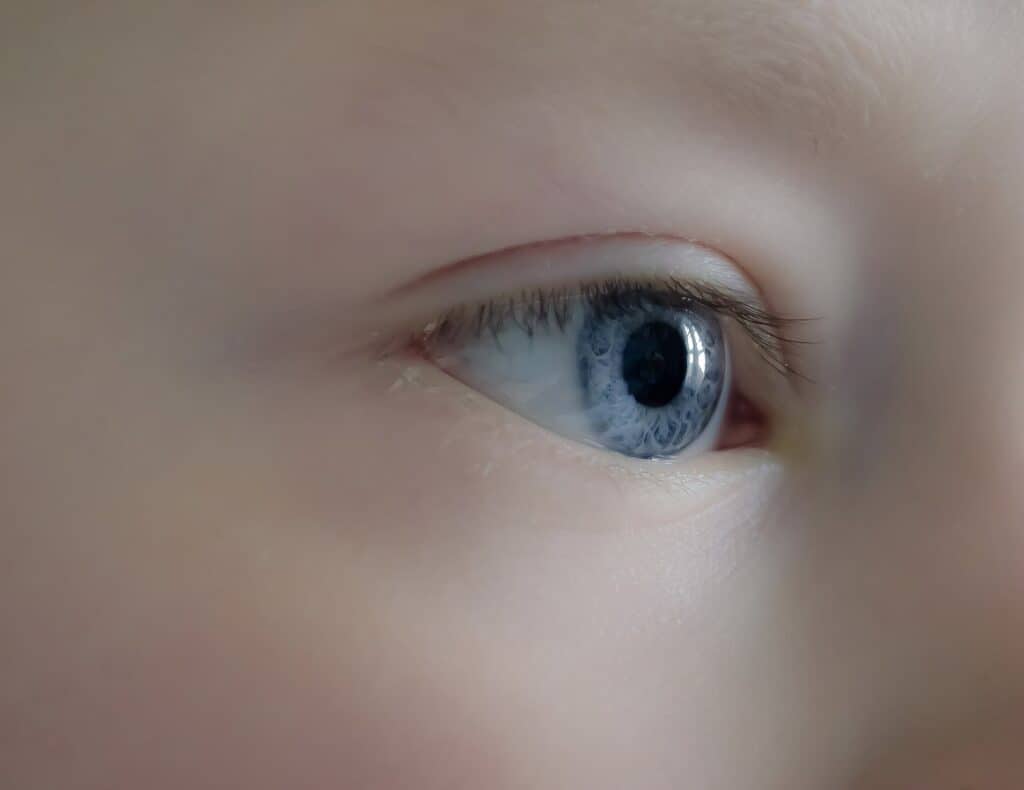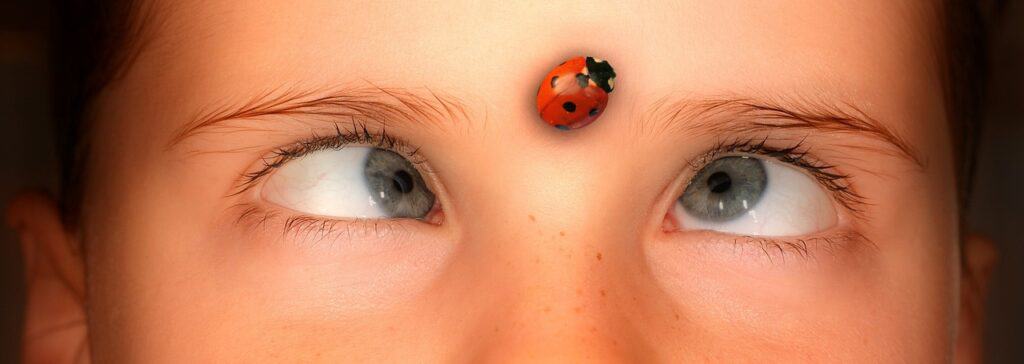It can be alarming for parents to see their baby’s eyes roll back in their head, but is it normal for babies’ eyes to roll back in their head? In many cases, it is a normal eye movement in babies, especially during the first few months of life. However, there are some situations where it can be a cause for concern.
Babies are born with undeveloped eye muscles and vision. As they grow and develop, their eyes learn to work together and focus on objects.
During this process, babies may exhibit a variety of eye movements, including rolling their eyes back. This is often a normal part of their development and should not be a cause for concern.

Key Takeaways
- Rolling eyes back is a normal eye movement in babies during the first few months of life.
- However, if it occurs frequently or is accompanied by other symptoms, it may be a cause for concern.
- Parents should consult a doctor if they are worried about their baby’s eye movements or development.
1. Normal Eye Movements in Babies

Babies are born with an immature visual system that is still developing. As a result, their eye movements may not be as coordinated as those of adults.
However, it is important to note that some eye movements in babies are normal and not a cause for concern.
Here are some normal eye movements in babies:
- Jerky eye movements: Babies may make jerky eye movements, known as nystagmus, especially when they are tired or overstimulated. This is a normal reflex that helps the baby focus on objects.
- Crossed eyes: It is common for babies to have crossed eyes, also known as strabismus, during the first few months of life. This is because their eye muscles are still developing, and they have not yet learned to coordinate their eye movements. However, if the crossed eyes persist beyond six months of age, it is important to consult a doctor.
- Rolling eyes: Babies may roll their eyes back in their head, especially when they are falling asleep. This is a normal reflex that helps the baby relax and prepare for sleep.
- Following objects: Babies should be able to follow objects with their eyes by the age of two months. This is a sign that their visual system is developing normally.
It is important to note that if a baby’s eye movements seem abnormal or if they are not meeting their developmental milestones, it is important to consult a doctor. Early intervention can help prevent vision problems later in life.
2. Abnormal Eye Movements: Causes

Abnormal eye movements in babies can be a sign of an underlying medical condition. The most common causes of abnormal eye movements in babies include nystagmus, strabismus, head injuries, infantile spasms, epilepsy, fever, lazy eye, hypoglycemia, West syndrome, cataracts, medical conditions, trauma, stroke, eye problems, febrile seizures, convulsions, neurological disorders, cerebral palsy, meningitis, encephalitis, paroxysmal tonic upgaze, congenital nystagmus, Leber’s congenital amaurosis, and brain tumors.
Nystagmus is a condition in which the eyes move involuntarily and can be caused by a variety of factors, including neurological disorders, head injuries, and eye problems. Strabismus, or crossed eyes, is a condition in which the eyes do not align properly and can be caused by muscle imbalances or neurological disorders.
Head injuries can cause abnormal eye movements, and infants who experience head injuries should be evaluated by a medical professional. Infantile spasms and epilepsy can also cause abnormal eye movements and are often accompanied by other symptoms such as seizures.
Fever, lazy eye, and hypoglycemia can also cause abnormal eye movements in babies. West syndrome is a rare form of epilepsy that occurs in infants and can cause abnormal eye movements, among other symptoms.
Cataracts and other eye problems can cause abnormal eye movements and infants with these conditions should be evaluated by an eye specialist. Trauma, stroke, and other medical conditions can also cause abnormal eye movements in babies.
Febrile seizures and convulsions can cause abnormal eye movements, and infants who experience these conditions should be evaluated by a medical professional. Neurological disorders such as cerebral palsy, meningitis, and encephalitis can also cause abnormal eye movements.
Paroxysmal tonic upgaze is a rare condition that causes abnormal eye movements and is often accompanied by other symptoms such as developmental delays. Congenital nystagmus and Leber’s congenital amaurosis are genetic conditions that can cause abnormal eye movements from birth.
Brain tumors can also cause abnormal eye movements and infants with these conditions should be evaluated by a medical professional. It is important to note that abnormal eye movements can be a sign of a serious medical condition, and parents should seek medical attention if they notice any unusual eye movements in their baby.
3. Symptoms and Warning Signs

Babies can display various symptoms and warning signs related to eye-rolling. Some of these signs may be concerning and require immediate medical attention.
Here are some of the common symptoms and warning signs associated with eye-rolling in babies:
Jerky Body Movements
Jerky body movements are one of the most common symptoms associated with eye-rolling in babies. These movements can be sudden and uncontrolled and may affect the entire body or specific body parts such as the arms or legs.
If your baby displays these symptoms, it is important to seek medical attention immediately.
Loss of Consciousness
In some cases, eye-rolling may be accompanied by a loss of consciousness. This can be a serious warning sign, and parents should seek medical attention immediately if their baby loses consciousness or appears to be unresponsive.
Limb Stiffening
Limb stiffening is another common symptom associated with eye-rolling in babies. This can be a sign of a seizure or other serious medical condition.
If your baby displays this symptom, seek medical attention immediately.
Oscillopsia
Oscillopsia is a condition that causes the world to appear to bounce or move around. This can be a sign of a serious medical condition, and parents should seek medical attention if their baby displays this symptom.
Overall, if your baby displays any of these symptoms or warning signs, it is important to seek medical attention immediately. While some causes of eye-rolling may be benign, others can be serious and require prompt medical treatment.
4. Diagnosis and Testing

If a parent suspects that their baby’s eyes are rolling back in their head or showing any other unusual behavior, they should seek medical attention from a pediatrician. The pediatrician will conduct a thorough examination of the baby’s eyes and medical history to determine the cause of the behavior.
During the exam, the pediatrician may test the baby’s visual acuity using age-appropriate methods. For example, they may use a light to check the baby’s pupillary reflexes or use a chart with pictures or symbols to test the baby’s vision.
In some cases, the pediatrician may refer the baby to a specialist, such as a pediatric ophthalmologist, for further testing and evaluation. The specialist may conduct additional tests, such as an eye exam under anesthesia, to get a more detailed look at the baby’s eyes.
It’s important to note that not all babies with unusual eye behavior have a serious underlying condition. Some babies may simply be exploring their environment or experiencing a normal developmental phase.
However, it’s always better to err on the side of caution and seek medical attention if a parent has concerns about their baby’s eyes.
5. Treatment and Management

If a baby’s eyes roll back in their head, it is important to seek medical attention immediately. Treatment will depend on the underlying cause of the eye-rolling.
In cases where the eye-rolling is due to a seizure disorder, medication may be prescribed to control the seizures. In some cases, surgery may be necessary to remove a brain tumor or correct a structural abnormality that is causing the seizures.
If the eye-rolling is due to a vision problem, such as strabismus or refractive error, eyeglasses or contact lenses may be prescribed to correct the issue. In some cases, eye muscle surgery may be necessary to correct the alignment of the eyes.
Parents can also help manage their baby’s eye-rolling by ensuring they get enough sleep and reducing their exposure to bright lights and loud noises. If the eye-rolling is due to a feeding or digestive issue, changes in diet or feeding routines may be necessary.
It is important to work closely with a healthcare provider to determine the best course of treatment and management for a baby with eye-rolling. Regular check-ups and follow-up appointments may be necessary to monitor progress and adjust treatment as needed.
6. When to Consult a Doctor

While it is common for babies to have their eyes roll back occasionally, it can also be a sign of a serious underlying condition. Here are some situations when parents should seek medical attention:
- If the baby’s eyes roll back frequently and persistently, it could be a sign of a seizure disorder. In this case, parents should consult a doctor immediately.
- If the baby’s eyes roll back during feeding or while sleeping, it could be a sign of a serious medical condition such as hydrocephalus or brain damage. Parents should consult a doctor immediately.
- If the baby’s eyes roll back along with other symptoms such as fever, vomiting, or lethargy, it could be a sign of meningitis. Parents should seek medical attention immediately.
- If the baby’s eyes roll back after an injury or a fall, it could be a sign of a concussion or other head injury. Parents should consult a doctor immediately.
In general, if parents have any concerns about their baby’s eye movements, they should consult a doctor. It is always better to err on the side of caution and seek medical attention when in doubt.
7. Prevention and Safety Measures

To prevent babies from rolling their eyes back, parents and caregivers should follow certain safety measures. The American Academy of Pediatrics recommends the following:
- Always support the baby’s head and neck when lifting or carrying them.
- Avoid shaking the baby vigorously or throwing them in the air.
- Ensure that the baby’s crib or bassinet is safe and free from any hazards such as loose bedding, toys, or cords.
- Keep the baby away from smoke and secondhand smoke as it can cause respiratory problems and increase the risk of sudden infant death syndrome (SIDS).
- Ensure that the baby is properly secured in a car seat when traveling in a vehicle.
It is also important to monitor the baby’s behavior and seek medical attention if they display any unusual symptoms such as rolling their eyes back frequently or excessively. Parents and caregivers should also take note of any changes in the baby’s feeding or sleeping patterns, as well as any signs of discomfort or distress.
In addition to these measures, parents and caregivers should also educate themselves on infant first aid and CPR in case of emergencies. This can help them respond quickly and appropriately in the event of an accident or sudden illness.
By following these prevention and safety measures, parents and caregivers can help ensure the health and well-being of their babies.
Conclusion

In conclusion, it is not uncommon for babies’ eyes to roll back in their heads, especially during the first few months of life. This can be due to a variety of reasons, including immature nervous system development, fatigue, or even a mild seizure.
However, if this behavior continues beyond the first few months, or is accompanied by other symptoms such as fever or vomiting, it is important to seek medical attention.
Parents and caregivers should also be aware of the difference between normal eye movements and abnormal ones. Normal eye movements include tracking objects and focusing on faces, while abnormal movements may include fluttering or rapid eye movements.
If there is any concern about a baby’s eye movements, it is best to consult a pediatrician.
Overall, while it can be alarming to see a baby’s eyes roll back in their head, it is often a normal part of development. However, it is important to be aware of any concerning symptoms and seek medical attention if necessary.
Related Posts:
Frequently Asked Questions
What causes a baby’s eyes to roll back?
Babies’ eyes can roll back for various reasons, including fatigue, overstimulation, or simply because they are focusing on something. It is also common for babies to roll their eyes back when they are falling asleep or waking up.
When should I be concerned about my baby’s eye rolling?
If your baby’s eye rolling is accompanied by other symptoms such as vomiting, seizures, or loss of consciousness, it is important to seek medical attention immediately. Otherwise, occasional eye rolling is usually not a cause for concern.
How long do newborns typically roll their eyes back?
Newborns may roll their eyes back for a few seconds or up to a minute at a time. This is usually normal and should not cause concern.
Can eye rolling be a sign of a seizure?
Eye rolling can be a sign of a seizure, especially if it is accompanied by other symptoms such as jerking movements or loss of consciousness. However, occasional eye rolling on its own is usually not a sign of a seizure.
What are some other normal eye movements for newborns?
Newborns may also exhibit other normal eye movements such as eye blinking, eye crossing, or eye tracking. These movements are part of the normal development of a baby’s visual system.
Should I be worried if my baby’s eyes roll back when they smile?
No, occasional eye rolling when a baby smiles is usually not a cause for concern. It is normal for babies to make a variety of facial expressions as they explore their environment and interact with caregivers.

Iesha is a loving mother of 2 beautiful children. She’s an active parent who enjoys indoor and outdoor adventures with her family. Her mission is to share practical and realistic parenting advice to help the parenting community becoming stronger.
